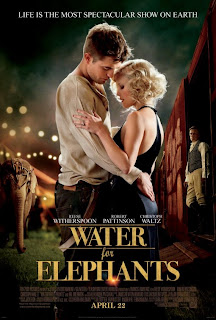
Clowning Around
I’ll be completely honest here and say that when I first heard about this film, I wasn’t at all enthused about it. That isn’t to say that I was severely against it in anyway, it’s just that the initial premise didn’t appeal to me that much and didn’t think much of it. Then, when I saw a trailer, I still didn’t think much of it, but something about the look of it enticed me. It did so much that I went to look up the cinematographer and was very surprised (and at the same time, not) to learn that it was Rodrigo Prieto. Considering how much of a film geek I am, as well as a huge Prieto fan, my anticipation turned 180 degrees, so much so that I even read the book and was ready for the film. The results are less than stellar, but there are some aspects that are quite attractive.
The meat of the story takes place in Depression-era America, where Jacob Jankowski (Robert Pattinson) is a veterinary student at Cornell about to take his finals. When a fatal accident robs him of his parents, his father’s business and home, he packs up as much as he can and heads out. He crosses paths with a traveling circus train where his skills with animals eventually get him a job there. The show is run by August (Christoph Waltz) who flips back and forth between charming sophisticate to temperamental tyrant in too few strokes. His wife Marlena (Reese Witherspoon) is the show’s beautiful headliner, complete with horse and elephant acts, and with whom a forbidden romance between her and Jacob start to predictably form.
The book that the film is based on is good, not great, and much of the film takes on a similar role. Francis Lawrence has made a handful of films, but so far they’ve all been technically good but haven’t yet had the emotional strength to exist beyond the screen. This films isn’t very different, as Lawrence lets all of the crafts breath with excellence, such as Jack Fisk’s sets and the aforementioned Prieto’s lensing, but it never feels to have much power beyond the screen. It strikes some chords at times, but that may be more of the power of the actors and the script, written by Richard LaGravenese, takes all the best parts of the novel and uses them to full effect. LaGravenese is responsible for some good and bad romantic adaptations, but he gets the formula right in this one, at least as best as it could be from the source material.
I know there’s a lot of hate for Pattinson, and I try not to give into it too much. I admit that he is a limited one, but when required to attain certain emotional beats, I think he carries his own. It’s nothing Oscar worthy, but it’s enough to have no serious distraction. Witherspoon makes this character a bit more in control than she was in the book, but I still find her to be rather passive, and despite all the charm that Witherspoon has, she can’t really get over that shortcoming. Waltz is without a doubt the most fascinating person on screen and steals scenes whenever he appears. I hope that notorious villains don’t become his whole career, even though won and Oscar for doing it so well, but he’s very fun to watch in a role he accomplishes very well. Hal Holbrook also shows up in bookending scenes as an older Jacob and Holbrook shows a tenderness that helps to begin and end this story.
This is a well made film, for sure, but unless you trip over glossy romantic stories set against a sweeping past time period, then I can’t say that you’ll love the film. It’s put together by a group of talented professionals, making it look good, and the cast does a nice job in handling their own roles and creating believable chemistry with each other. However, it never really succeeds beyond anything from the aesthetic, and while I have respect for the players involved, I can’t say that it’s something that will be remembered for years to come. Even still, it’s a fine film, and I have another opportunity to campaign for Rodrigo Prieto to receive a return invitation to the Kodak Theater.
B-


